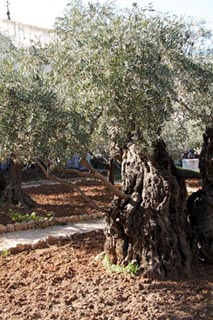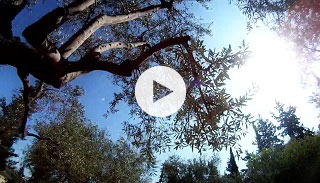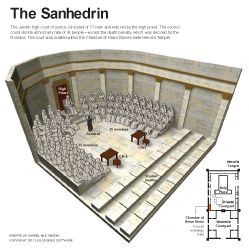14:1 the Passover and the feast of Unleavened Bread Feasts commemorating Israel’s deliverance from slavery in Egypt. Passover memorializes the evening God spared Israel’s houses while striking down the firstborn of the Egyptians (Exod 12:12–13, 26–27). The festival of Unleavened Bread recalls Israel’s departure from Egypt the following morning (Exod 12:17, 39; Deut 16:3).
chief priests See note on Mark 11:18.
14:2 an uproar by the people During the pilgrimage for the festivals, Jerusalem’s population would grow considerably—likely including many of Jesus’ supporters from Galilee. Arresting Jesus could lead quickly to a volatile situation.
14:3 Simon the leper Presumably a follower of Jesus. See note on Matt 26:6.
nard A costly, aromatic oil from an herb native to India (see John 12:3 and note).
14:5 denarii See Mark 6:37 and note.
14:7 you do not always have me Jesus speaks of a time after His resurrection when He will no longer be present with the disciples.
14:8 anointed my body beforehand for burial The woman likely intended to display her devotion, but Jesus interprets her act in light of His impending death.
14:11 he began seeking Judas must be careful to avoid rioting among Jesus’ supporters (see vv. 1–2). As one of Jesus’ closest disciples, he would be able to advise the chief priests on Jesus’ movements and choose an opportune moment.
14:12–26 Jesus observes the Passover celebration with His disciples. Mark’s account of the meal itself contains two parts: Jesus’ announcement that He will be betrayed (vv. 18–21) and His remarks about His body and blood (vv. 22–26). |
14:12 when they sacrificed the Passover lamb Jews celebrated Passover on the 14th day of the month of Nisan (March—April). Because they sacrificed the Passover lamb “at twilight” (Exod 12:6; Lev 23:5; Num 9:3), they actually consumed it on the evening that began the 15th of Nisan, “the first day of the feast of Unleavened Bread” (Lev 23:6).
 Israelite Calendar Table
Israelite Calendar Table
 Israelite Festivals Table
Israelite Festivals Table
14:13–15 Jesus’ directions in these verses are similar to His directions for obtaining the colt (Mark 11:1–3). |
14:19 Surely not I In the Greek text, the grammatical form of this question indicates that a negative answer is expected.
14:22 after giving thanks, he broke it Recalls Jesus’ miraculous feedings (6:41; 8:6). In the Passover, God had constituted Israel as a liberated nation through a meal. Here, Jesus reconstitutes the people of God with those who receive Him and His ministry.
Take it, this is my body By receiving the Lord’s Supper, Jesus’ followers accept Jesus as the Messiah who suffers and dies on their behalf.
14:23 they all drank from it Recalls James and John’s desire to share in Jesus’ vocation (10:38–39). See note on v. 36.
14:24 blood of the covenant Recalls Moses’ ratification of Israel’s covenant with God at Mount Sinai (Exod 24:8; compare Jer 31:31–34). Compare Zech 9:11.
poured out for many Compare Mark 10:45 and note.
14:25 in the kingdom of God The only occasion in Mark’s Gospel when Jesus speaks of being in the kingdom. This could be a reference to heaven following Jesus’ ascension or to the arrival of the kingdom of God in a more powerful manner following Jesus’ resurrection.
 The Kingdom of God: Already but Not Yet
The Kingdom of God: Already but Not Yet
14:26 after they had sung the hymn Refers to the conclusion of the Passover celebration. Jewish writings of the Second Temple period attest that Jews sang hymns after the meal (Jubilees 49:6; Philo, The Special Laws, 2.148), specifically Pss 113–118—the portion of the Psalter dedicated to the praise of God (Mishnah Pesah 10.6–7). Compare note on Matt 26:30.
Mount of Olives See note on Mark 11:1.
14:27 I will strike the shepherd A citation of Zech 13:7. Shepherds represent kings in Zechariah. Although Zech 13:7 originally referred to a worthless leader, here it is appropriated to refer to Jesus’ arrest, indicating that Jesus acts as a substitute.
14:32–42 Likely well after dark, Jesus goes to Gethsemane with His disciples in order to pray. In contrast to Jesus’ anguish, the disciples fall asleep. After two periods of distressed prayer, Judas arrives with a crowd to arrest Jesus. |
14:32 Gethsemane Likely a privately owned olive grove located at the foot of the Mount of Olives, directly across the Kidron Valley from the Temple Mount.
14:34 My soul is deeply grieved Jesus echoes the psalmist’s similar cry (e.g., Psa 42:5).
14:36 Abba, Father The Greek word used here is a transliteration of an Aramaic word that means “father.” In the nt, the word appears only here and twice in Paul’s letters (Rom 8:15; Gal 4:6).
Take away this cup from me Refers to Jesus’ impending torture and death (compare Mark 10:38–39).
14:42 Let us go Rather than suggest that Jesus was about to make an attempt to flee, this means just the opposite. Jesus arises to meet His betrayer.
14:43 chief priests and the scribes and the elders Representative of the religious establishment in Jerusalem.
14:45 kissed him A kiss signaled affection and respect, in contrast to Judas’ betrayal.
14:47 cut off his ear In Luke’s account, Jesus immediately heals the man’s ear (Luke 22:51; compare Matt 26:51).
14:49 scriptures would be fulfilled Jesus is likely referring to Isa 52:13–53:12 and Psa 22—both passages speak of the unjust suffering of an individual and are messianic in message.
14:51 a certain young man The youth’s identity is unknown, but it might be Mark himself. This figure appears only in his Gospel.
14:53–65 Although the Jewish leaders attempt to bring false witnesses against Jesus, the conflicting testimonies prevent them. After remaining silent throughout the accusations, Jesus acknowledges that He is the Messiah and the Son of Man. He immediately is condemned, beaten, and mocked. |
14:54 the courtyard of the high priest Refers to part of the high priest’s private residence.
14:55 Sanhedrin A council consisting of the most influential members of Jewish society. The Romans gave this body limited authority over internal Jewish matters.
testimony According to ot law, at least two witnesses were required in order to condemn someone to death (e.g., Num 35:30; Deut 19:15).
14:58 destroy this temple Jesus’ statements to this effect are not recorded in Mark (compare John 2:18–19).
within three days I will build another Possibly an allusion to Jesus’ resurrection (see Mark 8:31; 9:31; 10:34).
14:61 Blessed One A way of referring to Yahweh without saying the divine name.
14:62 I am Jesus’ response is a clear affirmation that He is the Messiah, unveiling what He tried to keep secret through much of Mark’s Gospel. It also reflects Yahweh’s self-revelation in the ot.
 Jesus’ ‘I Am’ Statements Table
Jesus’ ‘I Am’ Statements Table
Power Refers to God, focusing on the divine attribute most pertinent to the Son of Man’s coming (9:1; 13:26).
coming with the clouds of heaven An allusion to Dan 7:13. See note on Mark 2:10.
14:63 the high priest tore his clothes In the ot, tearing one’s clothes is a sign of grief (e.g., 2 Kgs 22:11; Esth 4:1).
14:65 began to spit on him Evokes Isaiah’s portrayal of the Suffering Servant (Isa 50:6).
14:66–72 During the trial, Peter is in a nearby courtyard, where he is recognized as a disciple of Jesus. Peter denies any knowledge of Jesus three times, fulfilling Jesus’ prediction (Mark 14:30–31). |
14:71 to curse Peter is willing to take a curse upon himself rather than be associated with Jesus. His curse probably took the common formula, “May such-and-such happen to me if I am speaking falsely.”

|
About Faithlife Study BibleFaithlife Study Bible (FSB) is your guide to the ancient world of the Old and New Testaments, with study notes and articles that draw from a wide range of academic research. FSB helps you learn how to think about interpretation methods and issues so that you can gain a deeper understanding of the text. |
| Copyright |
Copyright 2012 Logos Bible Software. |
| Support Info | fsb |
 Loading…
Loading…




